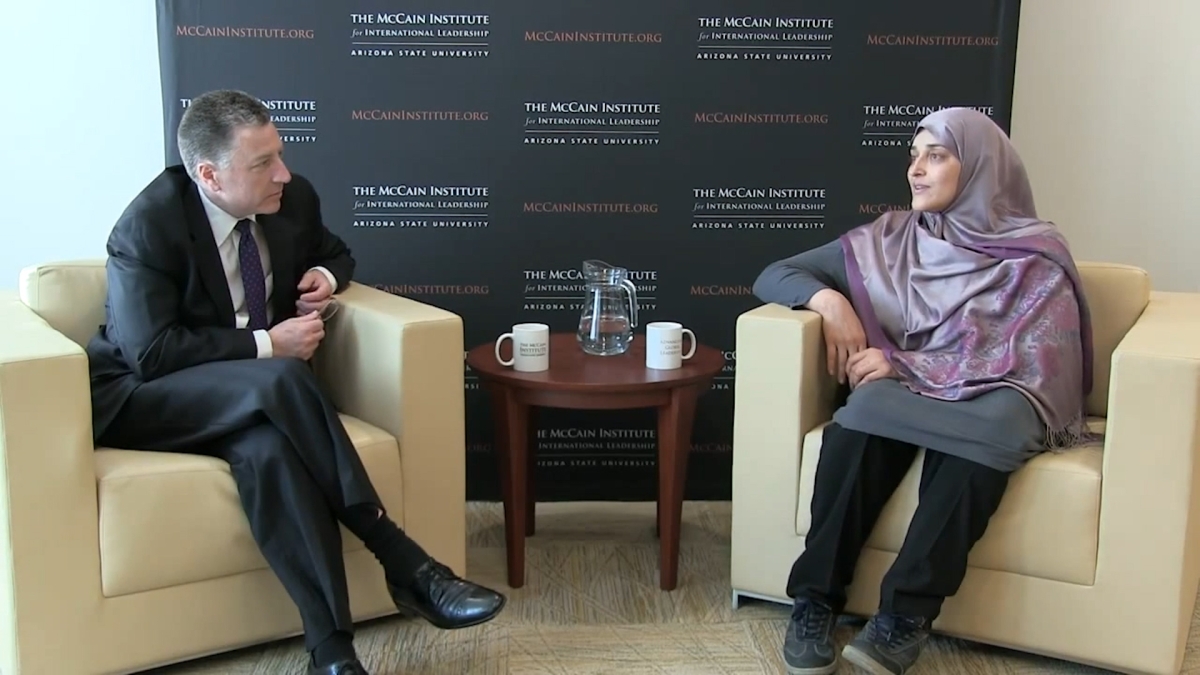ASU Insight: Introduction to Dr. Sally Kitch’s book - “Contested Terrain The Future of Afghan Women”

“Contested Terrain: The Future of Afghan Women”
New America Foundation in conjunction with The McCain Institute welcomed Dr. Kitch, Judge Basel and Ms. Afghani for a discussion on Dr. Kitch’s book and the future of Afghan women.
With the U.S. withdrawing from Afghanistan and a new Afghan government having assumed power, where does the future of Afghan women lie? In her new book, Contested Terrain: Reflections with Afghan Women Leaders, Sally L. Kitch explores the crisis in contemporary Afghan women's lives by focusing on the stories of Judge Marzia Basel and Ms. Jamila Afghani from 2005 through 2014, providing an oft-ignored perspective on the personal and professional lives of Afghanistan's women.
Participants:
Dr. Sally L. Kitch
Founding Director, Institute for Humanities Research
Regents' Professor of Women's and Gender Studies at Arizona State University
Author, Contested Terrain: Reflections with Afghan Women Leaders
Judge Marzia Basel
Founder, Afghan Women Judges Association
Ms. Jamila Afghani
Founder, Noor Educational and Capacity Development Organization
Founder, Afghan Women’s Islamic Network
Elected Member, Afghan NGO Humanitarian Country Team
Moderator: Peter Bergen
Director, International Security Program, New America
Dr. Sally L. Kitch is the founding Director of the Institute for Humanities Research (IHR), Regents' Professor of Women's and Gender Studies, Distinguished Sustainability Scientist at the Wrigley Institute for Sustainability, and Affiliate of the Piper Center for Creative Writing at Arizona State University. Her work focuses on feminist theory and epistemology, the intellectual history of gender and racial ideology, and the material effects of such representation on the lived realities of diverse women's lives.
Judge Marzia Basel was sworn in as a judge in 1995, just before the Taliban eliminated all women professionals in 1996. She was the founder of the Afghan Women Judges Association in 2003, an organization later banned by Afghanistan’s Supreme Court in 2007. She then worked for several international organizations in order to advance women’s rights through instruction in both civil and Shari'ah law. In 2008, she founded the Afghanistan Progressive Law Organization to fight injustices beyond the court system. In 2011 Marzia fled Afghanistan for fear of her life as a result of her work with international organizations. She now lives in Toronto, Canada, where she is seeking permanent residency. She remains involved in a number of organizations working on Afghan issues.
Ms. Jamila Afghani is the founder of the Noor Educational and Capacity Development Organization, which promotes the rights of women and girls by working with families to support the acceptance of girls’ schooling in rural areas and with imams to instruct congregations in what the Qur’an says about women’s rights. She personally overcame many obstacles, including family members’ conservatism and a disability that affected her since early childhood. Though disruptive, her family’s emigration to Pakistan to escape the Afghan civil wars allowed Jamila to obtain a degree from Peshawar’s Jinnah College for Women and a master’s degree in international relations. Back in Afghanistan since 2002, Jamila established the Afghan Women’s Islamic Network, an NGO that aims to create a network where women with Islamic education can pool their knowledge and support one another. She was also an elected member, and the only Afghan member, of the Afghan NGO Humanitarian Country Team, which decided on the distribution of government funds and donations in emergency situations, and established her own Afghan Women’s Professional Education Institute, which she officially registered with the Ministry of Education.